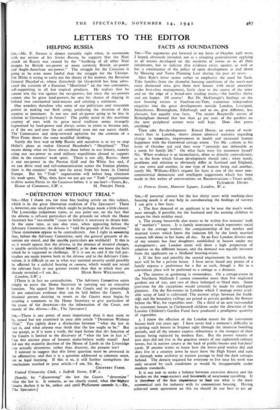DETENTION WITHOUT TRIAL "
Sta,---May I thank you for your fine leading article on this subject, which is in the great libertarian tradition of The Spectator? There is, however, one small point which might be perhaps made a little clearer. The Liversidge judgement turns, as you point out, on the fact that the ditenu is refused particulars of the grounds on which the Home Secretary has " reabonable " cause to believe it necessary to detain him. At the same time, as you also state, when appearing before the Advisory Committee, the ditenu is " told the grounds of his detention." These statemenorappear to be contradictory. Am I right inottauming that, before the.Advisory Committee, only the general grounds of de- tention are stated, and the specific particulars are- withheld? If this is so, it would appear that the ditenu, in the absence of detailed charges, is unable satisfactorily to defend-himself, as he does not know the facts which he is supposed to -challenge. If it is not so, and if the full par- ticulars are made known both to the ditenu and to the Advisory Com- mittee, it is difficult to see in what way national security could possibly be affected by a judicial hearing in camera, which would not reveal the relevant facts to any greater extent than that to which they are already revealed.—I am, &c., HUGH Ross WILLIAMSON. London, S.W. r.
[There is in fact no contradiction. The Advisory Committee exists simply to assist the Home Secretary in carrying out an executive function. No appeal lies from it to the Courts and its proceedings do not constitute evidence that can be laid before the Courts. A detained person desiring , to resort to the Courts must begin./ by securing a summons to the Home Secretary to give particulars of the cause of the detention—for the information of the Court, not merely of the ditenu.—ED., The Spectator.]






















 Previous page
Previous page